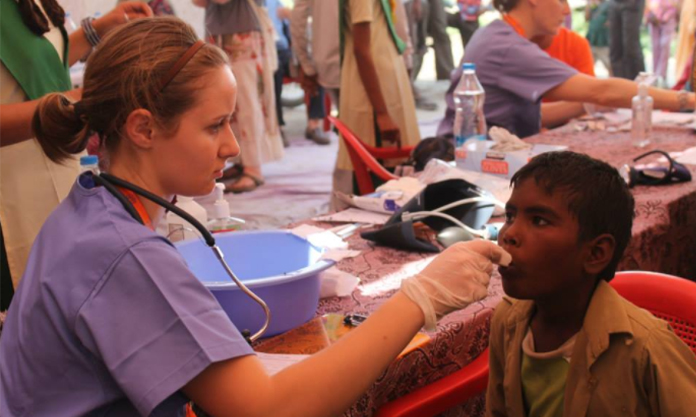Health & Hygiene
The mission of Pardada Pardadi Educational Society is to educate, empower and employ girls and women in the village of Annupshar, Uttar Pradesh, India. Without good health, attending school may not be a possibility.
PPES is committed to providing our students with quality health care, ensuring that they are at their best in order to succeed. We are also committed to health needs, as well as to health and hygiene education, of our staff, as well as the women and children of the village.
History
In 2012, PPES opened a student health centre. Our full-time school nurse and staff are available 6 days a week. PPES is the only school in the region that provides for health needs, as well as teaching health and hygiene to their students.
Due to the lack of quality health care and the demand for it, PPES opened Prana Health Center in 2016. This new clinic allowed for the expansion of the health program, providing quality medical care to students and staff as well as the villagers of Annupshar. Prana is a bright, clean space, equipped with a nurse and doctors office, exam rooms, a pharmacy, and space to conduct health education classes. There are medical volunteer opportunities at Prana, including patient care, public health and research projects, and the opportunity to train local medical professionals on better medical practices. The 180,000 people living here experience a lack of access to basic medical care. The vast majority of people suffer silently, and die, without a proper diagnosis from a medical professional. Tuberculosis, malaria, typhoid, polio, and diabetes affect this population. Educating our people on preventative healthcare is vital to minimize the spread of preventable diseases.
This is an exciting period for the health centre with immense opportunity for students and volunteers. With the help of the volunteers and donors, the people of this village will experience health care, which would have otherwise been both inaccessible and unaffordable to them.


Research Studies Director Vijaya Arun Kumar MD, MPH, DPH
Prevalence of Depression within the Bulandshahr District:
To determine the prevalence of depression amongst patients of varying demographic factors in the community of Anupshahr in the state of Uttar Pradesh in India, utilizing the validated PHQ-9 tool for subclinical depression and assess the need for a constructive course of action directed at the mental health of the population. WSU Research volunteer, Parth Patel along with volunteers from PPES, conducted the study. The data is presently being analyzed for publication. Anticipated completion date: Nov 2017.
Followed by the second phase that will involve diagnosis and intervention using telemedicine (Project partners being identified) Anticipated start date: Jan 2018
Telemedicine Project
The aim is to develop a creative rural telemedicine program that will not only bring the physician to the areas of need but will lead to the early management of patient and rapid transport to the final destination. Building a link between the tertiary site and the rural hospital is just the first step in developing a symbiotic relationship whereby there will be co-ordination in the provision of appropriate care to the patients at the rural site, along with appropriate triage of patients and early transport to the tertiary site. (Project partners being identified) Anticipated start date: Jan 2018.
Needs Assessment Project
To determine the actual health needs of the villagers of the Bulandshahr district. Research volunteers, Ayushi Agrawal and Sean Ojha, will conduct the study. It will involve a prospective evaluation of the health needs of the community including availability of basic resources, provision of health care and questionnaires to the population. Anticipated start date: July 2017.
Laboratory Installation Project
This study will evaluate the efficiency and effectiveness of starting a laboratory at a rural health center. Research volunteers, Sukhwinder Ajwal and Anvi Kumar, will conduct the study. The goal will be to help with the actual implementation of a lab at the health center and then follow up with the effectiveness of the intervention. Anticipated start date: July 2017
